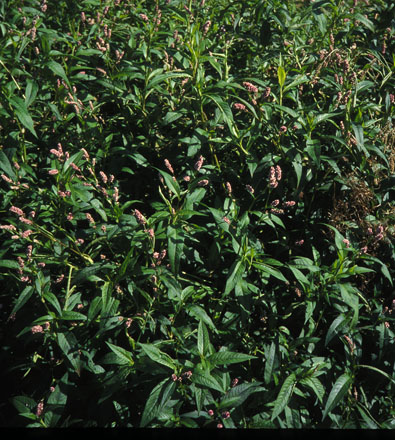
|
| Lady's Thumb; Polygonum Persicaria L. |
= Persicaria maculosa Gray |
Buckwheat Family; POLYGONACEÆ
|
| The buckwheat family contains hundreds of species, including those we classify as wildflowers, grains, ornamentals and
weeds. Genus Polygonum (from Greek, meaning many knees, in reference to its jointed knot-like stems) has 12 species wild in Seattle,
three of them already featured in this column: Japanese Knotweed (P. cuspidatum) in March 1992; Creeping Knotweed (P. arenastrum) in October 1993; Black Bindweed (P. Convovulus) in October 1991. |
| Lady's Thumb or Smartweed (P.
Persicaria) is a rather pretty weed, and although not as flamboyant as the
Japanese menace, is far more appealing than the scrawny bindweed and Devil's weed. It is essentially a weed of disturbed soil, and flourishes
in vegetable garden conditions, growing from 6 inches to two feet tall. The flowers, white to electric pink, are individually minute,
yet conspicuous because so many are jammed together into clusters, appearing from June into December. They make millions of
tiny black seeds. The leaves are delicate, and shaped much like fat weeping willow leaves, though with a characteristic spot blotched in
the middle. Winter's heavy frosts turn Lady's Thumb to brown mush. Then it reappears next spring as seedlings. |
| The name Smartweed has nothing to do with intelligence. It was originally given to a related plant
(P. Hydropiper), because when you bite a piece, it makes your tongue smart. It is great fun to show friends this plant, encourage them to nibble it, then
watch their reaction as the peppery zing pierces their nerves. But it is a weed of mucky watersides (as in Ravenna Park), not gardens, so
is relatively rare. |
| Ordinary Lady's Thumb is edible, and ranges in flavor from mild to a tad bit sharp and biting, but overall is nothing to
write home about. It doesn't taste good enough for admittance into my garden. |
Other names include: Virgin Mary's Pinch and Spotted Smartweed (from the marked leaves), Willow-weed and
Peachwort (from the leaf shape), Red Shank (from its stem color). Since it is not especially rambunctious, and is easy to yank up, Lady's
Thumb is not considered a major pest by most gardeners.
|
Originally published as the Seattle Tilth newsletter Weed of the Month in November 1994, along with an illustration from a book.
Back |
|
|

